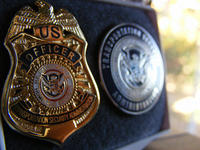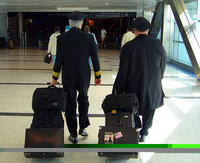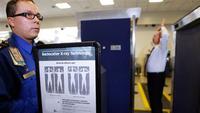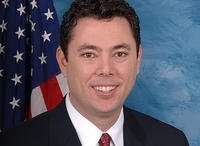-
DHS report: gap in TSA badging process poses threats

A new government report revealed that the Transportation Security Administration (TSA) is unable to accurately account for its employees who have access to secure areas in airports, resulting in a significant security gap
-
-
Pilots zip through security with expedited TSA program

On Tuesday, the Transportation Security Administration (TSA) launched a trial program for its new screening system for airline pilots that does not require them to be scanned or searched for prohibited items
-
-
Pilots zip through security with expedited TSA program
On Tuesday, the Transportation Security Administration (TSA) launched a trial program for its new screening system for airline pilots that does not require them to be scanned or searched for prohibited items
-
-
Aware wins TSA contract for employee fingerprint scanners
Aware Inc. recently won a contract to supply the Transportation Security Administration (TSA) with biometric fingerprint scanners to help the agency conduct employee background checks
-
-
TSA testing QR Codes on checkpoint signage
TSA will begin testing QR Codes at U.S. airports; the QR Codes are two-dimensional codes readable by barcode readers on smartphones; the codes may download, for free, from multiple sources on the Internet; when the code is scanned, the phone will take you directly to a Web page or other information without having to type any information into your phone
-
-
Making runways safer

Airplanes undergo significant stresses during take-off and landing, and parts often become detached, putting subsequent runway users at risk; until now, airport staff have had to monitor runways without technical assistance — an activity that is prone to errors; a new radar system is set to increase safety at airports
-
-
U.K. airports install biometric passport readers
Individuals with biometric passports from the United Kingdom or the European Union will now be able to use sophisticated automated e-Passport scanners at every major U.K. airport
-
-
Nano sensor detects minute traces of plastic explosives
Scientists have developed an extremely sensitive explosives sensor that is capable of detecting even slight traces of the high-explosive chemical compound pentaerythritol tetranitrate (PETN); terrorists had employed PETN in several attacks on commercial aircraft
-
-
Full-body scanning for the shy

The Transportation and Security Administration will soon launch Full Body Scanning 2.0 at several New York area airports; the new software, known as Automated Target Recognition (ATR), will auto-detect items that could pose a potential threat that passengers might be carrying under their clothes, but the suspicous items will be shown against a generic outline of a person for all passengers
-
-
The TSA-Chaffetz skirmish: The latest round
In the past ten days we have witnessed an intense legal-political skirmish between DHS and two of its staunchest critics on the Hill — Representatives Jason Chaffetz (R-Utah) and Darrell Issa (R-California); at issue is information that the Transportation Security Administration (TSA) had given the subcommittee headed by Chaffetz ahead of hearings the subcommittee was to hold on airport security; Chaffetz released the information in some of these documents to the press a day before the hearings, then repeated the information in his open-to-the-public opening statement; DHS angrily charged that in revealing the information, Chaffetz had violated the law
-
-
DHS chastises Chaffetz for disclosing sensitive information

Last week, DHS officials chastised Representative Jason Chaffetz (R-Utah) for disclosing sensitive security information to the press; in a letter, Joseph Maher, DHS’s deputy counsel, scolded Chaffetz, the chair of the House Subcommittee on National Security, Homeland Defense, and Foreign Operations, for openly discussing “sensitive security information” provided by the Transportation Security Administration (TSA); the letter comes in response to Chaffetz’s comments last week that revealed that there have been more than 25,000 security breaches at U.S. airports since November 2001
-
-
DHS seizes ancient Egyptian relics in smuggling bust

Last Thursday DHS officials made an announcement that seemed more fitting for a Hollywood movie — agents had broken up an antiques smuggling ring that had illegally shipped ancient Egyptian artifacts to the United States; among the confiscated goods was a sarcophagus that dated back to the seventh century B.C.
-
-
Airport explosive detection machines not up to regulation
A recent Government Accountability Office (GAO) report reveals that airports around the United States have failed to meet federal requirements for explosives detection systems and government regulators have done little to enforce them
-
-
Animal kingdom's alternatives to full-body scanners
A typical full-body scanner costs upward of $150,000, and critics maintain that for this high price-tag we get a detection system which is not fool-proof and which may be risky for our health; they point out that experience in IED diction in Iraq and Afghanistan shows that dogs are superior to scanners in detecting explosives — and that they are much cheaper ($8,500 for a dog plus training) and do not pose any health risk; some researchers say that mice and bees are even better bomb sniffers than dogs
-
-
Mica says TSA needs more independence from DHS
According to Representative John Mica (R-Florida), the Transportation Security Administration (TSA) needs more independence from DHS so that it may operate more efficiently; in an interview with Bloomberg, Mica, the chairman of the House Transportation committee said, TSA should be given “the authority to whack and hack some of the bad out”
-
More headlines
The long view
New Technology is Keeping the Skies Safe
DHS S&T Baggage, Cargo, and People Screening (BCP) Program develops state-of-the-art screening solutions to help secure airspace, communities, and borders
